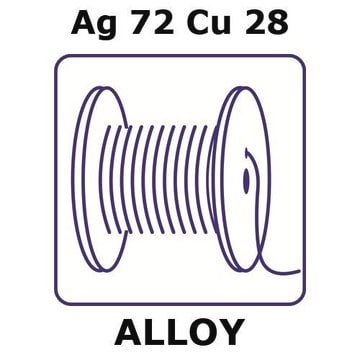GF71034869
Silver
insulated wire, 2m, conductor diameter 0.125mm, insulation thickness 0.0125mm, polyester insulation, 99.99%
Synonyma:
Silver, AG005840
Přihlásitk zobrazení cen stanovených pro organizaci a smluvních cen
About This Item
Lineární vzorec:
Ag
Číslo CAS:
Molekulová hmotnost:
107.87
MDL number:
UNSPSC Code:
12141740
PubChem Substance ID:
NACRES:
NA.23
Doporučené produkty
assay
99.99%
form
wire
manufacturer/tradename
Goodfellow 710-348-69
resistivity
1.59 μΩ-cm, 20°C
L × diam. × thickness
2 m × 0.125 mm × 0.0125 mm
bp
2212 °C (lit.)
mp
960 °C (lit.)
density
10.49 g/cm3 (lit.)
SMILES string
[Ag]
InChI
1S/Ag
InChI key
BQCADISMDOOEFD-UHFFFAOYSA-N
General description
For updated SDS information please visit www.goodfellow.com.
Legal Information
Product of Goodfellow
Storage Class
13 - Non Combustible Solids
wgk_germany
WGK 3
flash_point_f
Not applicable
flash_point_c
Not applicable
Osvědčení o analýze (COA)
Vyhledejte osvědčení Osvědčení o analýze (COA) zadáním čísla šarže/dávky těchto produktů. Čísla šarže a dávky lze nalézt na štítku produktu za slovy „Lot“ nebo „Batch“.
Již tento produkt vlastníte?
Dokumenty související s produkty, které jste v minulosti zakoupili, byly za účelem usnadnění shromážděny ve vaší Knihovně dokumentů.
S R Mueller-Spitz et al.
Letters in applied microbiology, 58(4), 330-337 (2013-11-30)
Polycyclic aromatic hydrocarbons (PAH) are a common environmental contaminant originating from both anthropogenic and natural sources. Mycobacterium species are highly adapted to utilizing a variety of PAH. Silver nanoparticles (AgNP) are an emerging contaminant that possess bactericidal properties, interferes with
Ana López-Serrano Oliver et al.
Environmental pollution (Barking, Essex : 1987), 189, 87-91 (2014-03-20)
Silver nanoparticles (AgNPs) are widely used in many applications and likely released into the aquatic environment. There is increasing evidence that Ag is efficiently delivered to aquatic organisms from AgNPs after aqueous and dietary exposures. Accumulation of AgNPs through the
Swarup Roy et al.
Journal of nanoscience and nanotechnology, 14(7), 4899-4905 (2014-04-25)
Binding interaction of biologically synthesized silver nanoparticles with bovine serum albumin (BSA) has been investigated by UV-Vis and fluorescence spectroscopic techniques. UV-Vis analysis implies the formation of the ground state complex between BSA and silver nanoparticles. The analysis of fluorescence
Cheng-Kuan Su et al.
Toxicology letters, 227(2), 84-90 (2014-04-08)
With the increasing prevalence of silver nanoparticles (AgNPs) in various products, whether such AgNPs will introduce new injury mechanisms from new pathologies remains to be determined. From the toxicokinetic viewpoint, it is vital to have in-depth knowledge of their in
Dawei Guo et al.
Journal of biomedical nanotechnology, 10(4), 669-678 (2014-04-17)
Several studies have suggested that silver nanoparticles (AgNPs) have the potential to treat human cancers, including leukemia. However, the detailed cellular mechanisms for AgNPs to inhibit the growth of leukemic cells and their efficacy on clinical isolates of leukemic patients
Náš tým vědeckých pracovníků má zkušenosti ve všech oblastech výzkumu, včetně přírodních věd, materiálových věd, chemické syntézy, chromatografie, analytiky a mnoha dalších..
Obraťte se na technický servis.

